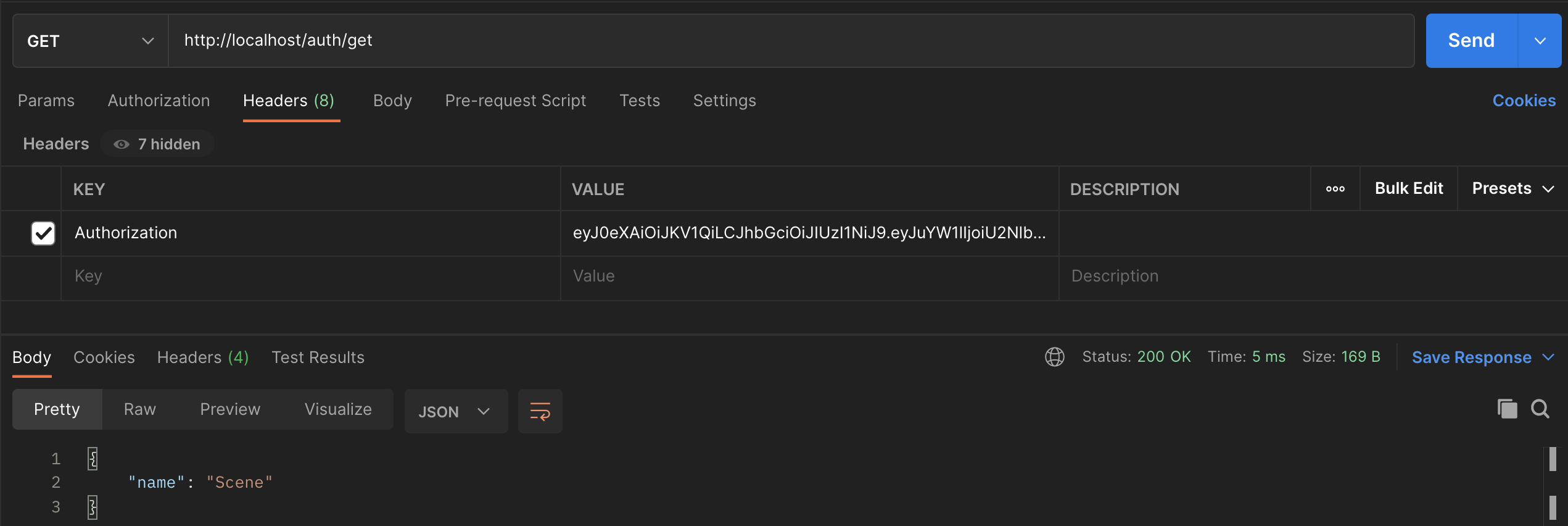패키지 설치
pip install bcrypt
pip install PyJWT비크립트(bcrypt) 사용법
- 비크립트란? : bcypt는 블로피시 암호에 기반을 둔 암호 해시 함수
bcrypt의 사용법은 두 가지로 나뉩니다.암호화와암호 일치 확인
암호화 방법
 (인코딩 과정)
(인코딩 과정)
bcrypt.hashpw(para1, para2)를 이용 하여, 인코딩을 실시para1: 첫번째 파라미터로는bytes-string이 필요 str 객체내의encode() 메소드를 이용하여, UTF-8 방식으로 인코딩을 해준 값을 넣어 wnsek.para2:bcrypt.gensalt()를 삽입하여,gensalt() : 소금생성기=>gensalt()메서드로 소금을 생성하면,b'바이트값드으으을'가 리턴된다. 리턴된 값은 bytes 형으로 출력
- 정리하자면,
str 객체=>bytes로 인코드=>salt를 이용하여 암호화=> (최종)bytes-string객체를 얻게됨
(디코딩 과정)
- 인코딩 과정을 통해서 얻게된
bytes-string객체를 => UTF-8 방식으로디코딩하여 => 다시str 객체를 얻게됨
예시코드
import bcrypt
password = "password"
encrypted_password = bcrypt.hashpw(password.encode("utf-8"), bcrypt.gensalt()) # str 객체, bytes로 인코드, salt를 이용하여 암호화
print(encrypted_password) # bytes-string
print(encrypted_password.decode("utf-8")) # str 객체
# 출력
b'$2b$12$6XEOimJ6msiHK7w/r7ayoO5W14cOVPLl8BPvmjhPJTWuo5RGRR.W6'
$2b$12$6XEOimJ6msiHK7w/r7ayoO5W14cOVPLl8BPvmjhPJTWuo5RGRR.W6암호 일치 확인 방법
bcrypt.checkpw(para1, para2) 함수를 사용하여 암호 일치여부 확인함para1:"문자열".encode("utf-8")<- utf-8로 인코드한 값para2:bcrypt.hashpw()로 나온bytes-string객체를 넣어준다
import bcrypt
encrypted_password = bcrypt.hashpw("password".encode("utf-8"), bcrypt.gensalt())
print(bcrypt.checkpw("password".encode("utf-8"), encrypted_password))
print(bcrypt.checkpw("pessword".encode("utf-8"), encrypted_password))
# 출력
True
FalsePyJWT
- JWT는 Jason Web Token을 뜻함
- PyJWT는 Python으로 JWT를 생성하는 데에 도움을 주는 모듈입니다. 이의 사용법은 암호화(인코딩)와, 복호화(디코딩)로 나뉩니다.
(암호화)
jwt.encode()로 우선 jwt 인코딩을 실시합니다.첫 번째 파라미터로는 인코딩 하고자 하는dict 객체- 아래 예제 코드에서
변수 json에 들어있는 dict값
- 아래 예제 코드에서
두 번째 파라미터로는시크릿 키- 아래 예제 코드에서
secret
- 아래 예제 코드에서
세 번째 파라미터로는알고리즘 방식을 삽입 합니다.- 아래 예제 코드에서
algorithm="HS256"
- 아래 예제 코드에서
(복호화)
jwt.decode()는 jwt.encode()로 인코딩한 JWT의 디코딩을 실시합니다.첫 번째 파라미터로는 디코딩 하고자 하는bytes-string객체- 아래 예제 코드에서
변수 encoded에 들어있는 bytes-string값
- 아래 예제 코드에서
두 번째 파라미터로시크릿 키(단, 이는 jwt.encode() 에 넣은 시크릿 코드와 일치 하여야 합니다)- 아래 예제 코드에서
secret
- 아래 예제 코드에서
세 번째 파라미터로는알고리즘 방식을 삽입 합니다.- 아래 예제 코드에서
algorithm="HS256"
- 아래 예제 코드에서
- (참고) 알고리즘에서 기본값은 256이지만, 512로 하면 토큰이 더 길어진다.
import jwt
json = {
"id": "justkode",
"password": "password"
}
encoded = jwt.encode(json, "secret", algorithm="HS256") # byte-string
decoded = jwt.decode(encoded, "secret", algorithm="HS256") # dict
print(encoded)
print(decoded)
# 출력
b'eyJ0eXAiOiJKV1QiLCJhbGciOiJIUzI1NiJ9.eyJpZCI6Imp1c3Rrb2RlIiwicGFzc3dvcmQiOiJwYXNzd29yZCJ9.TKGlCElSgGthalfeTlbN_giphG9AC5y5HwCbz93N0cs'
{'id': 'justkode', 'password': 'password'}전체 실습 코드
- 실습에서 bcrypt는 password를 암호화하는데 쓰임
- 실습에서 pyjwt는 name을 암호화하는데 쓰임
app.py
from flask import Flask
from flask_restx import Resource, Api
from auth import Auth
app = Flask(__name__)
api = Api(
app,
version='0.1',
title="Scene's API Server",
description="Scene's Todo API Server!",
terms_url="/",
contact="oneofakindscene@gmail.com",
license="MIT"
)
api.add_namespace(Auth, '/auth') # namespace에서 url 들어갈 부분 머로 들어가는지 확인해야함
if __name__ == "__main__":
app.run(debug=True, host='0.0.0.0', port=80)auth.py
# jwt.exceptions.DecodeError 에러가 났을경우 PyJWT 버전을 낮춰줘야한다. pip install 'PyJWT<2.0.0'
import jwt
import bcrypt
from flask import request
from flask_restx import Resource, Api, Namespace, fields
users = {}
Auth = Namespace(
name="Auth",
description="사용자 인증을 위한 API",
)
user_fields = Auth.model('User', { # Model 객체 생성
'name': fields.String(description='a User Name', required=True, example="Scene")
})
user_fields_auth = Auth.inherit('User Auth', user_fields, {
'password': fields.String(description='Password', required=True, example="password")
})
jwt_fields = Auth.model('JWT', {
'Authorization': fields.String(description='Authorization which you must inclued in header', required=True, example="eyJ0e~~~~~~~~~")
})
@Auth.route('/register')
class AuthRegister(Resource):
@Auth.expect(user_fields_auth)
@Auth.doc(responses={200: 'Success'})
@Auth.doc(responses={500: 'Register Failed'})
def post(self): # post : 계정 등록하는 역할을 하는
name = request.json['name']
password = request.json['password']
if name in users: # 이미 등록되어있으니 등록 안되고 Failed return
return {
"message": "Register Failed"
}, 500
else:
users[name] = bcrypt.hashpw(password.encode("utf-8"), bcrypt.gensalt()) # nmae을 키로하고 value에 비밀번호 저장
return {
'Authorization': jwt.encode({'name': name}, "secret", algorithm="HS256").decode("UTF-8") # str으로 반환하여 return
}, 200
@Auth.route('/login')
class AuthLogin(Resource):
@Auth.expect(user_fields_auth)
@Auth.doc(responses={200: 'Success'})
@Auth.doc(responses={404: 'User Not Found'})
@Auth.doc(responses={500: 'Auth Failed'})
def post(self): # post : id, pw 정보 일치하는지 여부 확인 <- 여기선 왜 post를 썻을까???
name = request.json['name']
password = request.json['password']
if name not in users:
return {
"message": "User Not Found"
}, 404
elif not bcrypt.checkpw(password.encode('utf-8'), users[name]): # 비밀번호 일치 확인
return {
"message": "Auth Failed"
}, 500
else:
return {
'Authorization': jwt.encode({'name': name}, "secret", algorithm="HS256").decode("UTF-8") # str으로 반환하여 return
}, 200
@Auth.route('/get')
class AuthGet(Resource):
@Auth.doc(responses={200: 'Success'})
@Auth.doc(responses={404: 'Login Failed'})
def get(self):
header = request.headers.get('Authorization') # Authorization 헤더로 담음
if header == None:
return {"message": "Please Login"}, 404
data = jwt.decode(header, "secret", algorithm="HS256")
return data, 200스샷
- register : POST
- 처음 등록했을 때

- 같은 걸로 두번째 등록하려하면 에러가 발생함

- 처음 등록했을 때
- login : POST
- 정상적으로 로그인 됐을 경우

- name or password가 틀렸을 경우

- 정상적으로 로그인 됐을 경우
- get : GET
- Headers에 login에서 확인했던
Authorization담아서 보냈을 때

- Headers에 login에서 확인했던
